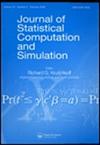具有随机易感性概率的复合负二项共享脆弱性模型
IF 1.2
4区 数学
Q4 COMPUTER SCIENCE, INTERDISCIPLINARY APPLICATIONS
Journal of Statistical Computation and Simulation
Pub Date : 2023-11-03
DOI:10.1080/00949655.2023.2274915
引用次数: 0
摘要
摘要在生存分析中,共享脆弱性模型被广泛用于模拟异质性。它假定家庭中的所有个人成员都有同样的弱点。此外,人们相信,人口中的所有个体都容易受到感兴趣的事件的影响,并最终将经历该事件。现实中的情况可能并不总是这样。可能有一部分人对某一事件不敏感,因此可能不会经历所研究的事件。非易感性采用复合脆弱性分布的脆弱性模型来模拟。此外,不同家庭的易感性可能不同。这可以通过对脆弱性分布参数进行随机化来实现。本文采用随机易感性概率的复合负二项分布作为脆弱性分布,将不同家庭的非易感性和不同易感性结合起来。用马尔科夫链蒙特卡罗方法在贝叶斯框架下求解了推理问题。然后将提出的模型应用于实际数据集。关键词:贝叶斯估计beta分布复合负二项分布共享脆弱性广义指数分布mcmc算法致谢感谢编辑和审稿人提出的意见和改进建议。披露声明作者未报告潜在的利益冲突。作者未获得任何研究经费。本文章由计算机程序翻译,如有差异,请以英文原文为准。
Compound negative binomial shared frailty model with random probability of susceptibility
AbstractThe shared frailty models are now popular for modelling heterogeneity in survival analysis. It assumes that the same frailty is shared by all individual members within the families. Also, it is believed that all the individuals in the population are susceptible to the event of interest and will eventually experience the event. This may not always be the situation in reality. There may be a certain fraction of the population which is non-susceptible for an event and hence may not experience the event under study. Non-susceptibility is modelled by frailty models with compound frailty distribution. Further, susceptibility may be different for different families. This can be attained by randomizing the parameter of frailty distribution. This paper incorporates both the things, non-susceptibility and different susceptibility for different families by considering compound negative binomial distribution with random probability of susceptibility as frailty distribution. The inferential problem is solved in a Bayesian framework using Markov Chain Monte Carlo methods. The proposed model is then applied to a real-life data set.Keywords: Bayesian estimationbeta distributioncompound negative binomial distributionshared frailtygeneralized exponential distributionMCMC algorithm AcknowledgmentsThe author is thankful to the Editor and the Referees for their comments and suggestions for improvements.Disclosure statementNo potential conflict of interest was reported by the author(s).FundingAuthor hasn't received any grant for research.
求助全文
通过发布文献求助,成功后即可免费获取论文全文。
去求助
来源期刊

Journal of Statistical Computation and Simulation
数学-计算机:跨学科应用
CiteScore
2.30
自引率
8.30%
发文量
156
审稿时长
4-8 weeks
期刊介绍:
Journal of Statistical Computation and Simulation ( JSCS ) publishes significant and original work in areas of statistics which are related to or dependent upon the computer.
Fields covered include computer algorithms related to probability or statistics, studies in statistical inference by means of simulation techniques, and implementation of interactive statistical systems.
JSCS does not consider applications of statistics to other fields, except as illustrations of the use of the original statistics presented.
Accepted papers should ideally appeal to a wide audience of statisticians and provoke real applications of theoretical constructions.
 求助内容:
求助内容: 应助结果提醒方式:
应助结果提醒方式:


